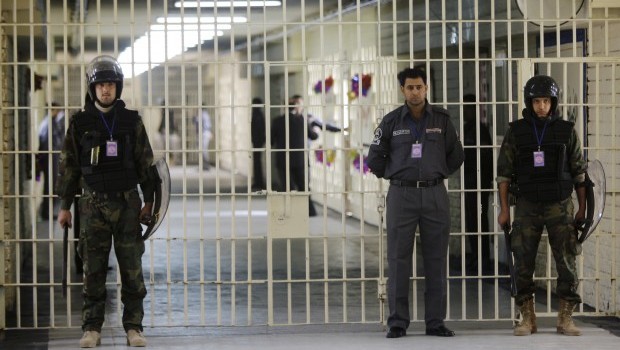
In this Feb. 21, 2009 file photo, guards stand at a cell block at the renovated Abu Ghraib prison, now renamed Baghdad Central Prison and run by Iraqis in Baghdad, Iraq. Late-night jailbreak attempts at two major prisons outside Baghdad have killed dozens, including at least 25 members of Iraqs security forces who battled militants armed with car bombs, mortars and machine guns, officials said Monday. (AP Photo/Karim Kadim, File)
The Al-Hout Prison in Al-Taji area, 32 kilometers (20 miles) north of Baghdad, and Baghdad Central Prison (formerly Abu-Ghraib) came under simultaneous attack by armed men on Sunday evening. A colonel in the Ministry of the Interior, speaking on the condition of anonymity, said Al-Taji prison was attacked by three men wearing explosive belts and two car bombs, which followed an attack by mortars. At the same time, another armed group launched a similar attack on Abu-Ghraib.
Sources confirmed Monday that the clashes ended after hours of fierce fighting that resulted in security forces regaining control of the two prisons and the surrounding areas, which were placed under curfew.
Iraqi justice ministry spokesman Wissam Al-Furayji told Asharq Al-Awsat that 21 prisoners were killed and 25 were injured in these attacks. Security and medical sources said at least 20 Iraqi security officers were killed, while around 40 were injured.
The sources added that “the two attacks took place around 8:30 p.m. Baghdad time, less than an hour after the end of fasting, and coincided with riots inside the prison by Al-Qaeda prisoners, which indicated coordination between the inside and the outside.”
They added that “the attacks on the two prisons were coordinated and explosive belts, car bombs and mortars were used. Around a hundred mortars were fired on the prisons, in addition to RPG-7 rockets.”
Furayji confirmed that “the areas surrounding the prisons in northwest Baghdad were placed under curfew to bring them under control. The areas are now under control and the fugitives are being hunted.”
In reply to a question about the casualties among prisoners, Furayji said: “We do not know; there are dozens of them and their bodies are strewn all over the prison yard.”
The attackers went through a number of checkpoints in a wide area northwest of Baghdad. Speaking about the nature and level of this security failure, Furayji said: “This is serious, and the security services are responsible.”
Hakem Al-Zameli, a Sadrist movement member and part of the parliament’s Security and Defense Committee, said in a news conference on Monday that “the attack which happened last night [Sunday] and the freeing and escape of prisoners from Abu-Ghraib and Al-Taji prisons is something we cannot ignore.”
He said there was a cover up of the number of escapees. “Information we have suggests that around 500 prisoners have escaped, while others talk about 1,000,” he said, adding that this includes Al-Qaeda commanders who have been sentenced to death.
Meanwhile, reports on extremist groups’ websites said “thousands” of prisoners escaped from the two prisons. Hanein, a jihadist website, published a report stating that “Abu-Ghraib, the prison of terrible reputation, is history. Meanwhile, we have received reports that thousands of our brothers are out of Al-Taji Prison.”
Twitter users also exchanged news on the prison attacks. Some groups close to Al-Qaeda reported that 6,000 prisoners had escaped.
In response, the justice ministry spokesman said: “This information is not accurate, because committees have been formed to prepare a prisoner inventory, which is being undertaken by the security forces and relevant authorities. Adding the fact that dozens of bodies from Al-Qaeda have been sent to the coroner for identification, this means that we cannot talk about numbers of escapees before these committees finish their tasks.”
Hamed Al-Mutlaq, an Iraqi List MP who is also a member of the Security and Defense Committee, told Asharq Al-Awsat that “the repetition of these attacks with this intensity and quality and the planning and methodology involved reveals a serious failure which can no longer be ignored, because ignorance would be a crime.” He added that “what happened proved that the government has failed at all levels.”
In the meantime, 12 people, mostly soldiers, were killed and 16 were injured in a suicide car bomb attack on a military convoy east of Mosul, in northern Iraq, according to security and medical sources. Iraqi army captain Aws Al-Hamadani said: “The attack took place around 9:00 p.m., while a military convoy was passing through the Kawkajli area in eastern Mosul [220miles/350 km north of Baghdad].”
Dr. Mahmoud Al-Jabiri from Mosul hospital confirmed the number of casualties, adding that there were four civilian deaths and six injuries among the victims.
A soldier also died in an explosion that hit an army patrol in the Ayn Jahsh area, 25 miles (40 km) south of Mosul, according to military and security sources.
These attacks coincided with the resignation of Maj. Gen. Nasser Ghannam, the commander of the 17th Brigade of the Iraqi army, which controls large areas south of Baghdad. Ghannam sited what he described as “unprofessional orders” and “wrong policies” of top military commanders as reasons for his resignation.
Meanwhile, the Iraqi Ministry of Defense announced the suspension of legal proceedings against members of the Infantry Division who committed the crimes of absence without leave and failing to report for duty, calling them to join their units before July 29.
